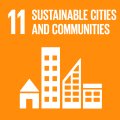UNITAC Hamburg Developing Innovative Tools to Support Sustainable City Planning
The Office of Information and Communications Technology (OICT) supports the United Nations and its partners’ goals of ensuring that no one is left behind, as envisioned in the 2030 Agenda for Sustainable Development, by leveraging the power of technology to help solve the world’s problems.
 A prime example is the role we play in the United Nations Innovation Technology Accelerator for Cities in Hamburg (UNITAC Hamburg), Germany. UNITAC Hamburg, a collaboration between UN-Habitat, OICT and HafenCity University, aims to harness the potential of digital technologies, data and innovation to both contribute to sustainable urban development and to have sustainable impact—especially for marginalized cities, communities and citizens.
A prime example is the role we play in the United Nations Innovation Technology Accelerator for Cities in Hamburg (UNITAC Hamburg), Germany. UNITAC Hamburg, a collaboration between UN-Habitat, OICT and HafenCity University, aims to harness the potential of digital technologies, data and innovation to both contribute to sustainable urban development and to have sustainable impact—especially for marginalized cities, communities and citizens.
UNITAC Hamburg’s focus is on contributing to accelerate the achievement of Sustainable Development Goals related to cities and urbanization. The focus is SDG 11—sustainable cities and communities—but all urban aspects of the SDGs will be considered. UNITAC offers:
- Strategy: analyze and provide technical expertise on urban digital transformation, data strategies and digital governance frameworks
- Tools: innovative approaches and digital tools on public participation, spatial analysis, mapping, data simulation and visualization


- Capacity: practical training, knowledge exchange and technical advice
Its team of technology, innovation and urbanization experts, and researchers use prototyping and applied research methodologies to develop digital solutions for a sustainable urban future. Two recent projects highlight this work.
BEAM (Building & Establishment Automated mapper)
Globally, about 1 billion people live in informal settlements, effectively outside of the state’s control. Located in South Africa, the eThekwini municipality has the largest number of informal settlements of any other municipality in the country, with over 587 informal settlements encompassing 314,000 households. These settlements house over a quarter of the city’s population.
The UNITAC team developed BEAM to address the challenge of gathering data of the informal settlements in eThekwini. The software uses machine learning, especially Deep Learning, to radically accelerate the spatial recognition of these settlements and structures based on aerial imagery.
The information allows the eThekwini municipality to maintain up-to-date records of the location and extent of its informal settlements, as well as to keep track of changes in the built-up area or density, enabling officials to respond to resident needs in an efficient and effective way.
City Resilience Diagnostic Tool
With the rapid pace of urbanization, risks of exposure to shocks (earthquake, floods, etc.) and ongoing stresses (lack of water, hot weather, migration, etc.) are steadily increasing. As cities continue to evolve, establishing constant assessments and analyses of urban settings and addressing factors determining resilience are critically important in ensuring livable environments and positive change for all.
The City Resilience Diagnostic Tool demonstrates the usefulness of relational knowledge graphs—database structures that excel at mapping relationships and connections—to analyze the complex inter-dependencies between shocks and stresses in a city.
Allowing for various types of analysis that could not easily be done otherwise, the tool is designed to reduce risks and improve the resilience of urban systems by providing cities with information on potential shocks, vulnerabilities and stresses.
To learn more about UNITAC Hamburg and its work to enable a sustainable urban future, visit: https://unitac.un.org/

